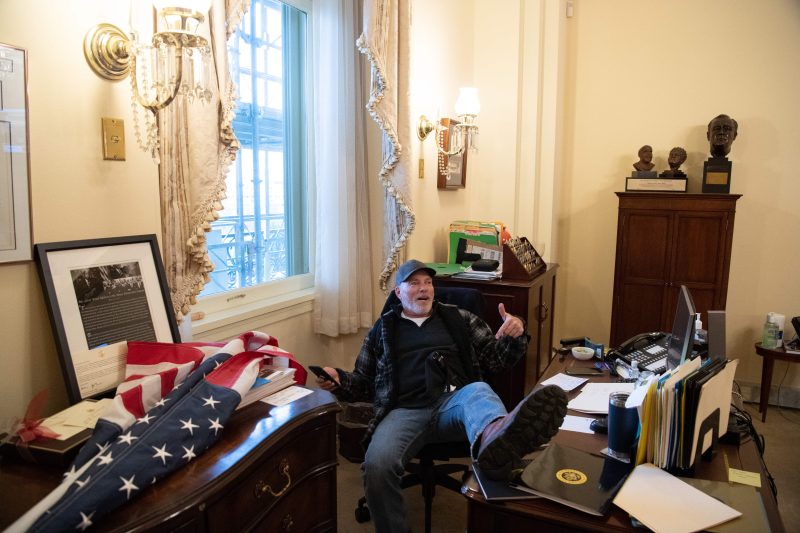
Man photographed in Pelosi’s office on Jan. 6 convicted of 8 counts
An Arkansas man who entered the U.S. Capitol with rioters on Jan. 6, 2021, and was photographed lounging at a desk in then-House Speaker Nancy Pelosi’s office suite was convicted Monday of eight federal crimes related to the incursion.
Richard “Bigo” Barnett, who acknowledged leaving a vulgar written message for Pelosi before departing the suite with a purloined envelope bearing the California Democrat’s digital signature, sat impassively as a jury in U.S. District Court in Washington delivered its verdicts.
After eight days of testimony and legal arguments in Barnett’s trial, the panel began deliberating Monday morning and reached guilty findings on all eight counts against him, including four felonies, in less than two hours.
As for potential prison time, the most serious charge in the case, obstructing an official proceeding, carries a maximum penalty of 20 years behind bars. Based on previous prosecutions of Jan. 6 defendants, however, advisory sentencing guidelines used by the court are likely to recommend a much shorter term for Barnett.
Although a prosecutor argued Monday that Barnett, who lives in Gravette, Ark., in the Ozarks, should be jailed pending his May 3 sentencing, Judge Christopher R. Cooper allowed him remain on home detention.
Barnett, a construction company employee in 2020 and an ardent supporter of then-President Donald Trump, was carrying a walking stick equipped with a 950,000-volt stun device when he entered the Capitol with a riotous mob. Congress was meeting that day to confirm Joe Biden’s victory in the presidential election despite Trump’s false claim that he had been denied a second term because of voter fraud.
In addition to obstructing an official proceeding, Barnett was convicted of two felonies related to carrying a dangerous weapon during the attack on the Capitol and a felony charge of civil disorder. The four misdemeanors he was convicted of included theft of government property, meaning the empty envelope.
Authorities said the stun device on his retractable walking stick was capable of rendering a person unconscious if held against the skin for 10 seconds.
Legally speaking, it did not matter to prosecutors whether Barnett sat or stood in the House speaker’s deserted office suite. His alleged criminal presence in the Capitol was the key issue in his trial.
But what brought him to viral notoriety was his decision to recline nonchalantly in a staff member’s swivel chair and plunk his left work boot atop the desk.
Like Jacob Chansley, the shirtless so-called QAnon shaman, who roamed the Capitol in face paint and horned headgear during the riot, and another accused trespasser, often referred to as the “zip tie guy,” who scaled the Senate gallery wearing military fatigues and carrying a fistful of plastic handcuffs, Barnett became an avatar of the Jan. 6 mayhem in widely viewed images captured by photojournalists.
Chansley was sentenced to 41 months in prison. The accused “zip tie guy,” identified by the FBI as Eric Munchel, is awaiting trial in U.S. District Court.
On the witness stand last week, Barnett said he was “pushed” past the massive Columbus Doors on the Capitol’s East Front by a surging mob and wandered into Pelosi’s office suite while searching for a bathroom. He told jurors that he kicked back at the desk and plopped a foot up after two news photographers asked him to “sit down and act natural.”
Both photojournalists denied Barnett’s assertions in statements after his testimony, saying Barnett acted on his own and they did not urge him to pose. Neither photographer was called to testify in the case.
After exiting the Capitol, Barnett waved the stolen envelope in front of video cameras and boasted that he had left a note on the desk for Pelosi, reading, “Nancy, Bigo was here, you b—-.” Shouting hoarsely, he added, “I put a quarter on the desk” for the envelope “even though she ain’t f—ing worth it.”
In court, Barnett’s lawyers said their client had suffered a cut during the riot and that he took the envelope out of the building because his blood was on it, making it a biohazard. They also argued that the envelope was not “stolen” because 25 cents was fair compensation.
They said Barnett did not enter the building willingly, that he was carried in by the tide of the mob. They said he did not obstruct an official proceeding because by the time he entered the Capitol, at 2:43 p.m., the joint session of Congress already had recessed because of the riot. They said the stun device on his “Hike ’n Strike” walking stick was broken, therefore he was not carrying a dangerous weapon.
“Right now, the world hates Richard Barnett,” defense attorney Joseph D. McBride said in his closing argument Friday. “The world looks at him in disgust. … There really is no place for a man like him in today’s world. But that’s not a reason to convict him.”
Prosecutors scoffed at each of Barnett’s defenses, saying in court that he had lied on the witness stand in an effort to minimize his culpability. Apparently the jury also was unmoved by Barnett’s testimony. The panel did not begin deliberating on the eight charges until 9:30 a.m. Monday, and they finished well before lunchtime.
Then Barnett, surrounded by his attorneys and loved ones, walked out of the federal courthouse, headed home to western Arkansas to await his sentencing.
“I’m a Christian,” he had said on the witness stand in apologizing for his crude missive to the then-House speaker. “It just wasn’t good. It wasn’t who I am.”
But Assistant U.S. Attorney Michael M. Gordon ridiculed that statement, as well.
“He is regretful that he got caught,” Gordon told the jury in his closing argument. “He is regretful that he is being prosecuted. … He is not regretful that he, personally, participated in an effort to stop the peaceful transfer of power.”
